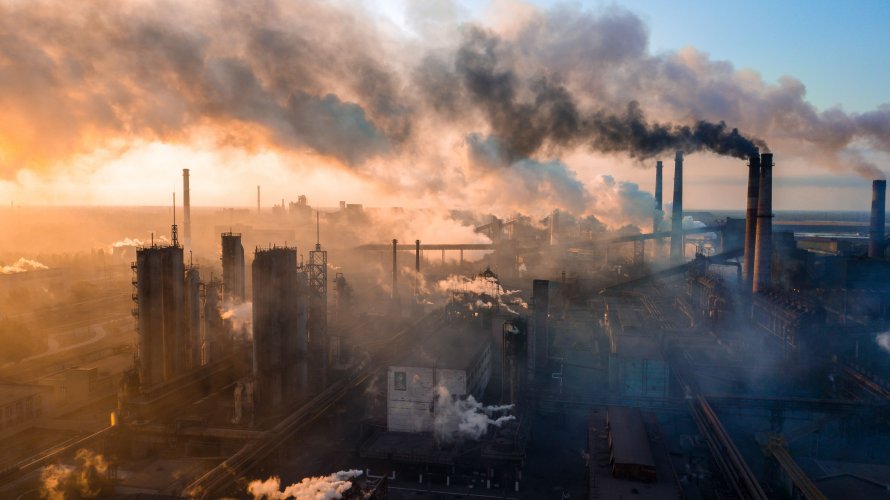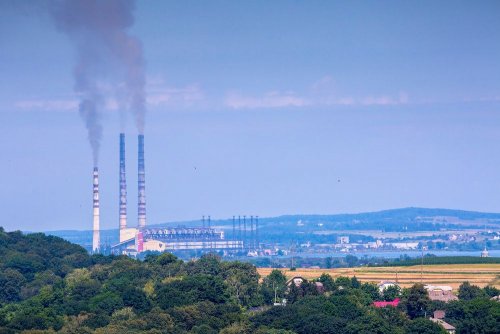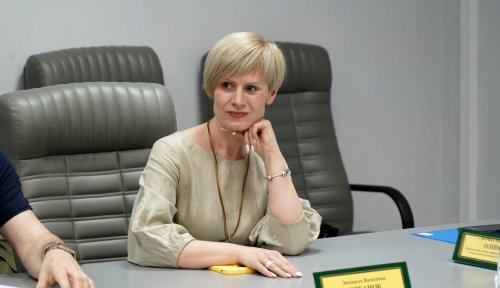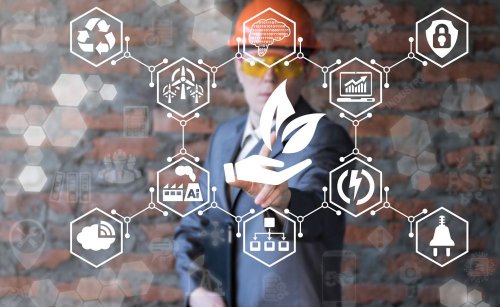On June 20, the Verkhovna Rada adopted Draft Law No. 11355 "On Integrated Prevention and Control of Industrial Pollution." It provides for the implementation of Directive 2010/75/EU on industrial emissions into Ukrainian legislation and the introduction of best available techniques and management methods (BAT) in production. Such measures should ensure the complete modernization of Ukrainian industry and bring the level of pollution control to the EU level.
However, there is a fly in the ointment: the draft law still has some flaws that could lead to the closure of some enterprises and a collapse in the permitting system.
Ecopolitic analyzed the impact of the draft law.
What is draft law No. 11355 about?
As part of the requirements of the EU-Ukraine Association Agreement, Ukraine is obliged to implement the provisions of Directive 2010/75/EU on industrial emissions into Ukrainian law. The Verkhovna Rada has repeatedly tried to do so, but to no avail. Another attempt is the draft law No. 11355. It launches a reform of industrial pollution control in Ukraine and introduces common regulatory rules with the EU. Directive 2010/75/EU provides for a reduction in the maximum permissible emissions of harmful substances. Therefore, Ukrainian enterprises will gradually have to switch to European standards.
This transition will take 12 years: four years are allocated for the implementation of BAT conclusions, and another seven years for the complete modernization of industrial enterprises based on BAT.
The draft law also introduces an integrated environmental permit – a single permit document that will combine permits for pollutant emissions, special water use, and waste management.
How did the industrial pollution reform move in Ukraine?
One of the first attempts to implement the norms of Directive 2010/75/EC into Ukrainian legislation was the vote for draft law No. 4167 "On the prevention, reduction and control of pollution resulting from industrial activity" in 2021. It was developed in accordance with the requirements of the EU, but at the stage of the first reading, the draft law was rejected.
Next came the turn of draft law No. 6004 on control of industrial pollution. It was controversial and did not satisfy all interested parties, so several versions of the draft law appeared. In the end, version 6004-d "On ensuring the constitutional rights of citizens to an environment safe for life and health" got into the Verkhovna Rada.
But on June 19 of the current year, the vote on draft law No. 6004-d ended in failure. One vote was not enough for approval: 225 deputies out of the required 226 supported the draft law.
"The result of 5 years of efforts by experts, civil servants, managers, the health of residents of industrial regions, the issue of Ukraine receiving €50 billion from the EU for reconstruction, the prospect of joining the European Union – all this depended on the press of a button," commented Andriy Gunko, coordinator of the international technical assistance project "Best Available Techniques and Management Methods (BATM) for Ukraine," emotionally.
Such voting results for the European integration law outraged some deputies and public activists. They focused on the fact that the people's representatives ignored another bill that was supposed to be adopted as part of the implementation of the Association Agreement with the EU.
Olga Boyko, coordinator of the Industrial Ecology and Sustainable Development Committee of the European Business Association, emphasized that the adoption of the draft law on industrial pollution is urgent. Its adoption is one of the points, the fulfillment of which is mandatory for receiving financial assistance under the Ukraine Facility plan in the 3rd quarter of 2024.
On the same day, when the vote for draft law 6004-d failed, people's elected officials hurriedly began to "work": 6004-d was re-registered as 11355. The next day, June 20, the Eco Committee of the Verkhovna Rada recommended that the draft law be included in the agenda as urgent. The Verkhovna Rada supported the bill on the same day.
Since draft law No. 11355 completely repeats the failed 6004-d, its registration and promotion is a violation of the voting procedure . Article 107 of the Law of Ukraine "On the Regulations of the Verkhovna Rada of Ukraine" provides that "a draft law rejected by the Verkhovna Rada or a draft law that repeats it in essence cannot be introduced at the current and subsequent special sessions of the Verkhovna Rada of the corresponding convocation." Since draft law No. 11355 was voted in a hurry, it left the same shortcomings as in the previous one. Experts from the ecological environment express doubts about the effectiveness of the future reform made in haste. Although many are simply tired of waiting for at least some legislative framework.
"Draft law 11355 is so "overripe" that it is better to adopt it with minor flaws than to sabotage its adoption under the guise of good intentions," said experts from the SaveDnipro NGO.
This long and ineffective process clearly reflects the immaturity of legislative processes, the lack of legislative competence and expertise in matters of adapting legislation to EU regulations in Ukraine.
What are the remaining shortcomings in the draft law?
Specialists of the European Business Association believe that it is necessary to review the requirements for the installation of automated emission monitoring systems (AMS) based on NDTM. They emphasize that it is economically impractical to install ASM on facilities and installations that are to be decommissioned in the short term after the reform.
The coordinator of the Industrial Ecology and Sustainable Development Committee of the European Business Association, Olga Boyko, emphasized the need to cancel time limits on the introduction of NDTM.
"Directive 2010/75/EU, which is implemented by Draft Law No. 11355, does not provide for any time limits. In 2018, 133 derogations from BAT conclusions were granted in the EU for 98 facilities operating in 15 Member States. Of these, 22 derogations were granted for an indefinite period of time. For some reason, we chose 7 years. The restrictions on the derogation of BAT implementation at existing enterprises proposed by Article 13 of the draft law should be canceled," Boyko commented.
Olha Boyko emphasized that Ukrainian industrial enterprises have limited access to financial support from the state for the implementation of NDTM, therefore not all will have time to modernize in the time specified by the law. Instead, according to her, since 2000, EU companies have received more than 800 billion euros in state aid.
According to her, some enterprises, whose facilities have outdated technologies or are heavily damaged as a result of military operations, may refuse to modernize them, deciding to withdraw such installations altogether.
"Most of these enterprises are city-forming for certain settlements. Their closure may lead to certain social and economic problems. It takes time to open new production facilities that compensate for jobs and tax revenues. That is why the period of mandatory decommissioning of such facilities, which cannot exceed 10 years, proposed by Article 29 of the draft law No. 11355, is insufficient and should be increased to at least 15 years," the expert believes.
Collapse due to integrated resolution?
The European Business Association emphasizes that the new permit system prescribed in the draft law does not take into account the peculiarities of wartime. According to the law, as early as 2028, activity in certain sectors of the economy will be possible only in the presence of a new integrated permit. The process of preparing documents for its receipt is quite long. In the conditions of war, the collected information can quickly lose relevance due to circumstances independent of the company.
EBA experts believe that it is necessary to postpone the transition to new permit documents for the post-war period and ensure the possibility of obtaining them within four years after the end of martial law.
Olha Boyko noted that an imperfect transition to a new permit system could lead to a collapse in the Ukrainian economy.
"For example, if the Ministry of Environment decides that all existing permits for pollutant emissions, special water use, and waste treatment operations are no longer valid. After all, everyone will have to obtain a new integrated permit that will replace them all. Based on the experience of introducing new license conditions for hazardous waste management, which led to the automatic revocation of existing licenses, this prospect is more than real," the expert commented.
The draft law is European integration, but the implementation is not quite
Yuriy Maslov, head of the board of the Alliance for the Restoration of Ukraine, believes that representatives of industrial enterprises and non-governmental environmental protection organizations are excluded from the draft law on the process of formation of the NDTM manual. According to him, this is a violation of the requirements of Article 13 of Directive 2010/75/EU and may affect the effectiveness of the implementation of NDTM.
"Paragraphs 13 and 14 of the preamble to Directive 2010/75/EU set out the procedure for the establishment of a BAT guide. It is created by holding a transparent forum in which stakeholders exchange information to identify the best available technologies. Information is exchanged between Member States, interested industries, and non-governmental organizations that promote environmental protection.
Did you forget about the money for modernization as usual?
The draft law states that financing of the prescribed measures will come from the following sources:
- state funds from budgets of all levels;
- own money of enterprises;
- voluntary contributions for modernization;
- other sources of financing that are not prohibited by law (loans, grants, international financial assistance).
As a result of the war in Ukraine, production was significantly reduced. Some enterprises are not working at full capacity. A significant number of production facilities were destroyed during the shelling. At the same time, enterprises do not receive profits and experience losses. Because of this, it will be very difficult for businesses to carry out modernization measures at their own expense, at the same time, within the time frame specified by the draft law.
General Director of the Center for Ecology and Development of New Technologies, Vladyslav Antipov наголошуё, that the draft law does not clearly define the sources of funding for measures to implement NDTM.
"The draft law does not provide for specific mechanisms for obtaining such funding. This is a very important issue, as almost all environmental reforms in previous years have stalled due to the lack of clear sources of funding," Antipov commented.
The modernization of industry in the European Union, and the implementation of Directive 2010/75/EU on the introduction of NDTM, is generally financed by grants from EU funds. So business and government could look for financial support abroad. But the war in Ukraine prevents such financing.
"It is almost impossible to introduce BAT in a time of war. There are objective factors for this. It is impossible to attract capital, impossible to use global technologies (foreigners will not come to us to adjust them) and very difficult to build (due to shelling and insufficient number of workers)," says Vladyslav Antipov.





